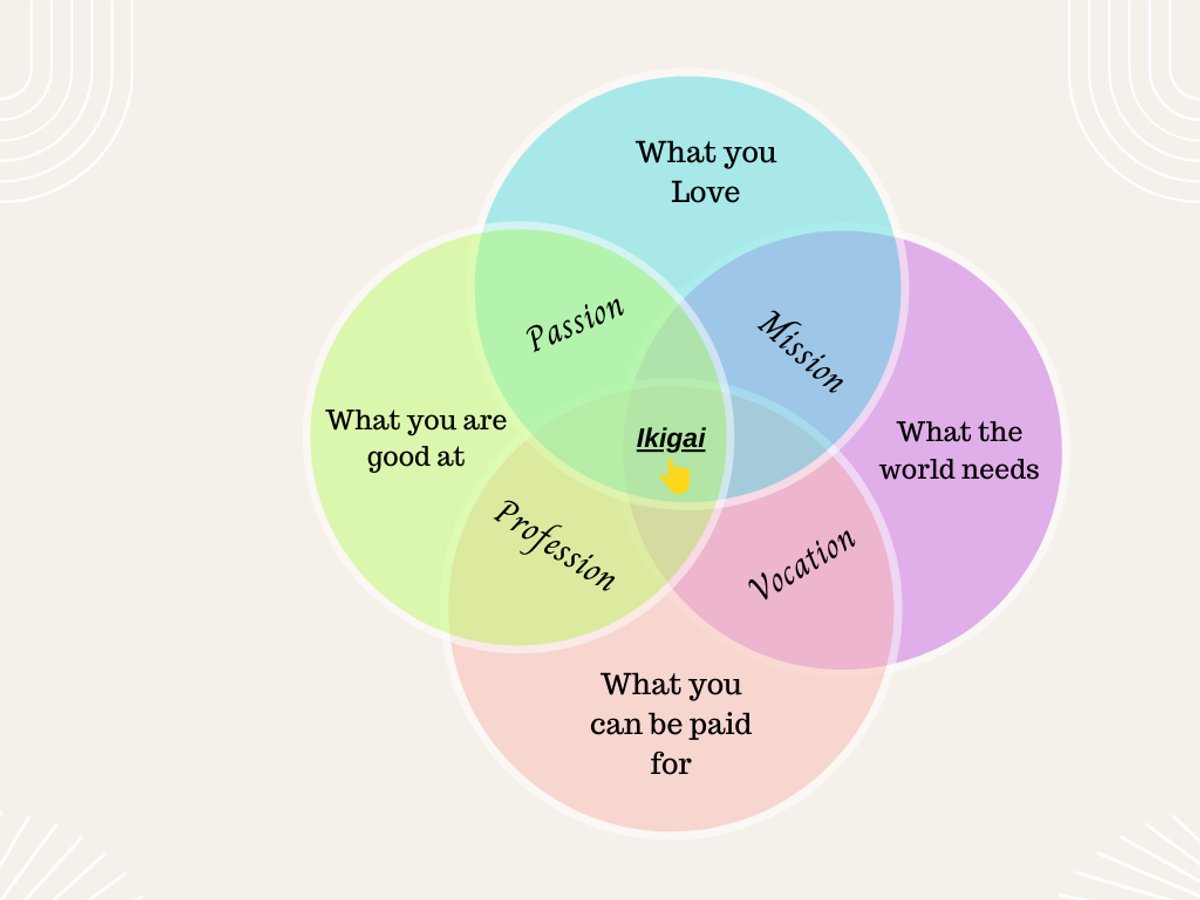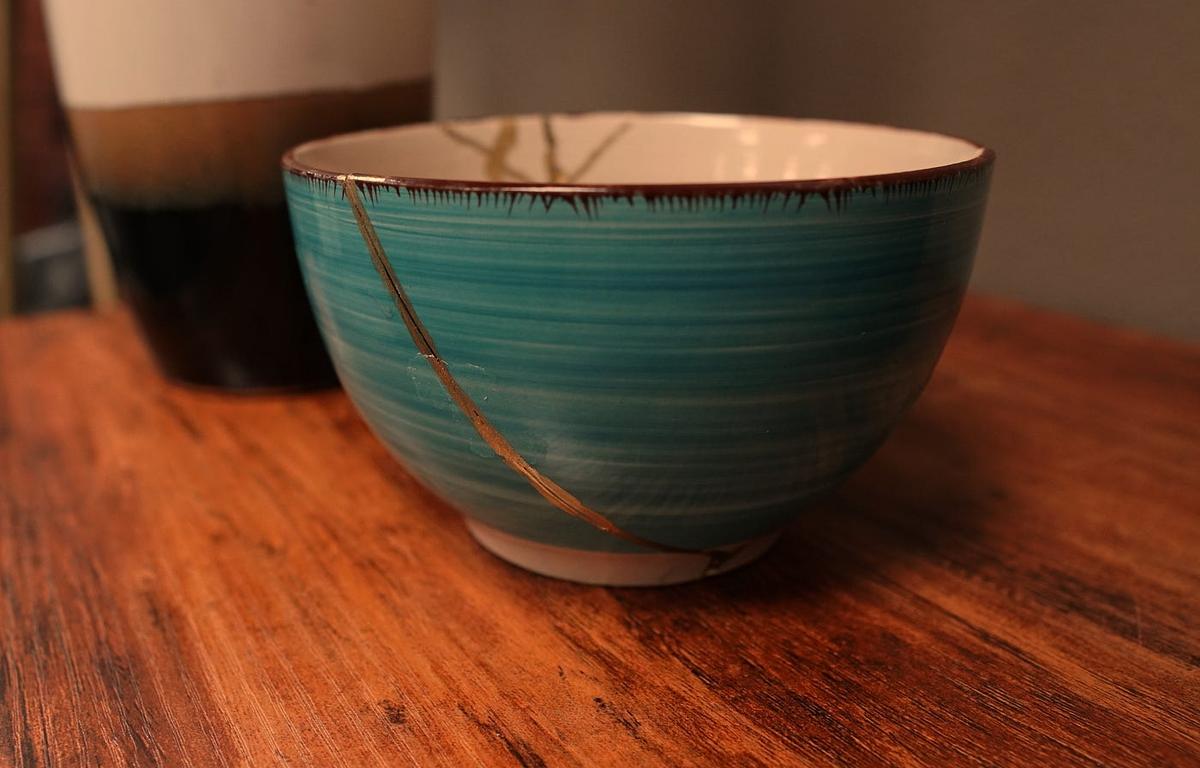Seven Japanese Concepts for Life Transformation:

We’ve made life complicated for ourselves by always chasing after something. There’s nothing wrong with having desires or goals, but ultimately, we all want to be happy.
The secret to that is appreciating small things in life while working on our dreams, and these seven Japanese concepts will help you achieve this mindset.
1. Ikigai aka - reason for being
The term “Ikigai” is derived from two Japanese words, ‘Iki’ means “life” and ‘gai’ (originally “kai”) refers to “value” or “worth.”According to the book Ikigai, “It’s the happiness of always being busy”.
The Japanese philosophy of Ikigai was originally about finding your true happiness.In a modern interpretation, it serves as a tool to find your dream career. The people of Okinawa Island believe it’s their reason to get up every morning.
You can use it as a guiding force that tells you what you’re meant to do by aligning your passion with what the world needs today.
How to practice the Japanese concept of longevity
Every person has an ikigai. You can find it by aligning your passion, strengths, and values with the needs of the hour.
Ask yourself these four questions to find your Ikigai:
- What do you love doing?
- What are you good at?
- What can you be paid for?
- What does the world need?
Mark Winn presents these questions through a Venn diagram that helps find that “sweet spot” where your passion, vocation, profession, and mission intersect. That very spot represents your Ikigai.
Image by the author
Ikigai: The Japanese Secret to a Long and Happy Lifeis worth reading if you want to dive deep into this philosophy.
2. Wabi-sabi - beauty in simplicity
Do you often struggle to take the next step or start something new because your basic tendency is to chase perfection? Does fear of failure stop you from executing your plans? If you’re nodding by now, this Japanese concept of beauty, aka wabi-sabi, is for you to live by.
Wabi-Sabi is about reminding ourselves that everything in this life is temporary, so there’s no sense in chasing perfection. Instead, we must try to find the beauty in simplicity and make the most of the present moment, for that’s all we’ve got.
Wabi-sabi is an intrinsic aspect of traditional Japanese aesthetics focused on simplicity and rustic beauty. It’s applied in their cultural ceremonies, architecture, and art. It also shares a connection with Zen Buddhism, which focuses on mindfulness.
Today, everyone is obsessed with a perfect lifestyle, body shape, house, partner, and whatnot. This obsession comes from external pressures, social media, and the fear of missing out.It takes a toll on people’s mental health and social lives and keeps them from living fully.
Practise Wabi-sabi to embrace life as it is in the best possible way.
- Focus on the present moment by embracing all aspects of your life journey
- Shift your focus from perfection to excellence that comes by taking the first step
- Learn to make the most of what you already have instead of begrudging
- Embrace all the ups & downs and wins & losses, for they only make everyone’s journey unique and beautiful
- Make resilience your superpower by extracting learning from a mistake.
3. Shinrin-yoku - Forest bathing
The simple act of spending time in nature is known as shinrin-yoku. It’s the most relevant Japanese concept for improving life by re-establishing our lost connection with nature. According to an EPA-sponsored 2001 study, the average American spends 83% of their time indoors and 6% in a closed vehicle.
Leading this intense indoor lifestyle has made humans less mindful of sustainable practices that protect the environment. It rarely gives us time to unplug from technology and the hustle of life. Here Shinrin-yoku comes into the picture as a free and accessible therapeutic antidote.
In his recent study, Dr Qing Li also reported the tangible health benefits of forest bathing. It improves sleep quality, elevates mood, enhances focus, reduces blood pressure and stress levels, etc.
This also helps you do a digital detox, which we all need to experience.
Shinrin-yoku is an incredible Japanese concept that encourages mindfully spending time in nature by actively involving all five senses.
It’s all about absorbing the serenity of nature that promotes mental, physical, and spiritual well-being.
- Find an ideal spot surrounded by trees, water, and mountains, ideally, a forest. But if you’re in a city, a nearby park will also do
- Carry out only the essentials and no digital devices
- Spend time walking and soaking in the natural beauty around
- Go slow and feel the breeze against your skin, listen to the birds chirping, dry leaves crushing under your feet
- Observe tiny details like the sunlight entering through the canopy, patterns of leaves, climbers, etc.
- Smell the aroma of the moist soil and blooming flowers
- If you’re with a guide, consult them before touching a plant or tasting fruits or edible leaves.
4. Ma - the negative space
It’s a philosophical Japanese concept that signifies physical space or gap between the beginning and end. Ma has been a part of Japanese art, design, and architecture in the minimalist Tatami homes in Japan.
The idea behind this concept goes beyond minimalism or decluttering, for Ma also represents a pause in time or emptiness in space. It’s about allowing yourself to appreciate the stillness that our fast-moving generation is forgetting.
We’re always running from task to task, consuming information, and filling the remaining time with social media or other digital distractions. We all must replace this urgency to always be busy by appreciating the stillness of the present moment.
The principle of Ma is also a way of socializing for the Japanese. Be it in their deliberate long pause while bowing before someone to convey respect and true feelings. Or while having a conversation or making a thoughtful decision that isn’t a conclusion of rushed thoughts.
Practising Ma allows you to contemplate thoughts in silence and is considered sophisticated in Japanese culture. It enhances your intellectual and intuitive sense. This way Ma is also a physical manifestation of spirituality.
- So, the next time you’re alone and free, appreciate that moment rather than filling it with random social media scrolling, or
- Hold hugs for a bit longer, and have deliberate eye contact while shaking hands,
- Take time before jumping to conclusions or
- Listen actively and calmly to respond and have a meaningful conversation.
5. Kaizen - small steps to improvement
The word root of Kaizen” consists of two Japanese terms, ‘kai’ means ‘change’ and ‘zen’ is ‘good’. It’s a progressive approach of taking smaller, consistent steps that compound over time to bring a substantial change or improvement.
In the present day and age, Kaizen is an undervalued concept because of its steady and slow nature. It’s a subtle yet employee-friendly way to bring improvement within an organization. This philosophy serves as the basis for thriving Japanese businesses like Toyota.
It allows everyone in the team to adapt to a changed environment without making radical transformations. Kaizen empowers everyone to identify gaps or inefficiencies in the existing systems.
The core belief behind Kaizen is that everything has a scope for improvement, and nothing is the status quo.
This helps bring innovative solutions aimed at improving ongoing processes and systems, whether in productivity, effectiveness, or safety standards.
A few more benefits of this Japanese business philosophy are :
- active team contribution,
- improved employee and customer satisfaction,
- enhanced retention,
- better problem-solving approach
- lesser errors, and reduced waste of time, resources, and effort.
The goal of Kaizen is not to reach perfectionism but to find solutions, adapt to changes, enhance team spirit, and improve continuously by not settling just for the sake of the status quo.
6. Shikata Ga Nai - it can't be helped
Shikata Ga Nai or Shō (ga) nai is the Japanese concept of letting go of things you can’t control. Shikata Ga Nai simply refers to “it can’t be helped,” which encourages people to accept things or situations as they are.
There are many instances in life where unexpected incidents occur, like disasters, economic crises, or the death of a loved one. We neither prepare ourselves for such events nor make them part of our plans. But such unfortunate events happen, and it’s crucial to accept and overcome them to move on in life.
This is possible when you make internal peace with what has happened and persevere even in adversity.
- Stop fighting or denying the situation that you’re struggling to make peace with,
- Give it some serious thought and see if you can do anything to change it,
- If you know there’s nothing that you can do about it, shift your focus to finding ways that will help you adapt to your situation,
- Don’t compare your life with other people and be in the present moment,
- Self-reflect on the situation to understand what went wrong or how you can face similar challenges further in life with greater strength,
- Have patience and trust the process and the fact that you’re a resilient being.
7. Kintsugi - the concept of broken things
The literal meaning of “Kintsugi” is ‘join with gold’.It’s the art of repairing broken objects, often ceramic pottery or glass, by using gold lacquer to mend the cracks and give them an aesthetic appeal.
Urushi is the traditional lacquer used by the Japanese to glue broken pieces while practising Kintsugi. Then, the object with the lacquer is set aside to dry and further sanded smoothly. In the end, gold, silver, platinum, or copper finishing powder is sprinkled over the lacquer to give it a refurbished look.
The deep philosophy behind Kintsugi is all about
- Embracing imperfection - highlights the cracks not as flaws but as something that draws people’s attention.
- Minimizing waste—rather than discarding the broken object, it’s repaired to promote sustainable resource use and reduce the need to buy unnecessary new products.
- Allowing ourselves to make mistakes, for they only make our journeys uniquely interesting.
If you’re going through a heartbreak, economic crisis, or failure, implement Kintsugi.
- Remind yourself it’s not the end of the world. These are only a few battles that you might have lost, but you’ve prepared yourself to win the war.
- Pick yourself up and make these scars your gold lacquer that will shape your life better than you’ve ever imagined.
So, life might not be perfect at this moment as per your plans, but have faith that it will be beautiful in the end. You’ll come out stronger because of everything you’re going through now.
Final Words
Life is uncertain, and sometimes things don’t go as planned. The important thing is to keep looking for ways to make the most of what we have. These seven Japanese philosophies allow everyone to do this, regardless of where they belong.
1. Ikigai: aka reason for being
2. Wabi-sabi: beauty in simplicity
3. Shinrin-yoku: forest bathing
4. Ma: The negative space
5. Kaizen: Small steps to improvement
6. Shikata Ga Nai: it can't be helped
7. Kintsugi: the concept of broken things.
Practising them is easy if you’ve got the will, discipline, and determination to lead a meaningful life. These Japanese concepts can transform your life for good by offering you strength, wisdom, and courage to face any adversity with grace.







